The most powerful laxative in drops. Strong laxative.
Difficulties during bowel movements cause some problems for a person. This causes pain, the development of hemorrhoids and other pathologies.. Consultation with a doctor and treatment will help get rid of the symptoms of digestive tract disease. To quickly relieve the unpleasant feeling in the intestines during constipation, you need to know what quick laxative you can prepare yourself at home.
Types of drugs
Absence of the urge to go to the toilet or problems with bowel movements for more than two days require treatment. Dry and dense feces should alert you, especially in combination with sharp pain in the abdominal area. Chronic constipation leads not only to complications, but also to the development of serious diseases such as cancer. To eliminate fecal congestion, agents are used to activate intestinal motility and soften stool during defecation. According to the mechanism of action, medications affect: 
- Irritation of intestinal receptors using chemical influence. Drugs help reduce nerve endings mucous membrane, helping feces move through the intestines. This group includes natural herbal medicines: joster fruit, senna leaves, buckthorn bark, rhubarb root and synthetic products such as phenolphthalein and castor oil.
- Softening feces. Mild excretion of feces is provoked by the use of almond, Vaseline or olive oil .
- Mechanical irritation. Medicines affect the liquefaction of stool, which leads to irritation of intestinal receptors. These are agar-agar, Epsom salts and osmotic drugs that disrupt the absorption of fluid.
Vegetables for constipation
If problems with bowel movements are not a symptom of another disease, then you can use traditional medicine recipes. Effective therapy will not only not harm the body, but also will not destroy beneficial bacteria. Such drugs are used only to quickly solve the problem, so they should not be used in the chronic form of the disease:
- Pumpkin. The vegetable helps well with difficulties with bowel movements; it is consumed both raw and as an additive to cereals, salads, soups or stews.
- Beet. Fans of dishes with this product do not complain of constipation because it is a natural laxative. To do this, you will need to drink 1/3 glass of freshly squeezed beet juice or eat ½ of the fruit.
- Potato. Vegetable juice is used for constipation, providing gentle emptying and diluting stool.
Cleansing salad “Metelka” has an effective effect on intestinal motility.. To prepare it, you need to grate beets, celery, carrots on a fine grater and add shredded white cabbage to them. A homemade laxative should not be added with salt or oil. The combination of these ingredients has a positive effect on the functioning of the digestive system.
Oil for constipation
Many people face the problem of bowel movement, which can be eliminated with the help of oil. This product of mineral or plant origin softens stool and reduces its friction with the mucous membrane: 
- Castor oil. The medicine is obtained from castor beans and has been popular since Ancient Egypt. Its action is to soften feces and prevent fluid absorption. When taking the oil orally, its effectiveness will be noticeable 2-6 hours after consumption, so it is best to take it in the morning.
- Linseed oil. Omega acids and vitamins contained in the product have a beneficial effect on the functioning of the gastrointestinal tract. The product is used both for the rapid treatment of constipation and for the fight against chronic illness. To empty your intestines, you need to drink 1 tbsp in the morning on an empty stomach. l. oil an hour before meals, with a glass cold water. You can also mix 1 tbsp. l. medicine with ½ glass of cold milk and drink the mixture before going to bed.
- Olive oil. The drug relieves bloating and relieves irritation of the mucous membrane. To do this you need to drink 1-2 tbsp. l. oil on an empty stomach in the morning, but you should not drink it with water or other drinks for an hour after taking it.
- Mineral oil. This is a transparent, odorless, artificial liquid that relieves constipation. A strong laxative at home prevents fluid absorption and softens the consistency of stool. The effect of its use occurs after 8 hours, so it is recommended to drink the oil before bed.
- Vaseline oil. The product is evenly distributed throughout the intestinal walls, creating a protective barrier. It improves peristalsis of the digestive tract and softens stool, making it easier to empty. The product is taken 2 tsp. 2 hours before or after meals. With a low laxative effect, the dosage is increased to 2 tbsp. l.
Oils effectively combat bloating, hard stools and constipation. But these drugs are prohibited from being used by people with individual intolerance to avoid an allergic reaction.
Herbal infusions and decoctions
Plants that can be found in any pharmacy perfectly cleanse the intestines. This the method is ideal for those who suffer from constipation. Here are some effective recipes: 
- Add 1 tbsp to a glass of warm water. l. buckthorn bark or senna leaves. Everything is thoroughly mixed and set aside for 20 minutes in a water bath. After this time, the liquid is drained and the sediment is squeezed out. Warm boiled water is added to the resulting medicine until you get a glass of the drink. The decoction is divided into two doses; it should be drunk in the morning and in the evening. The infusion is taken once, because the herbs are addictive.
- Pour 2 tsp into a glass of boiling water. dry dandelion leaves and infuse for 10 minutes. This plant can be replaced with nettle or licorice, they all have laxative properties. The solution should be consumed three times a day. The body does not get used to this natural medicine, so it can be used both once and on an ongoing basis.
- Pour 1 tsp into a glass of boiling water. crushed yarrow, dry or fresh. The decoction should sit for 50 minutes. Reception is carried out 3-4 times in knocks of 80 ml.
- Horse sorrel roots are added to 500 ml of boiling water, and the mixture is sent to a steam bath for 10 minutes. For a laxative effect, you need to drink a glass of medicine before bed.
- 10 g of plantain seeds are poured into 125 ml of boiling water. The infusion is infused for 10 minutes, after which it is consumed in one gulp before meals.
- Burdock root and fresh plantain leaves are taken in equal proportions. The plants must be washed, placed in a container with warm water and boiled for 20 minutes over low heat. After complete cooling and straining, you need to take the solution three times a day, ½ cup before meals.
Enema for constipation
This procedure is considered the fastest and most effective for constipation.. It is prepared on the basis of water, combining it with laxatives and oil solutions. To do a standard enema yourself you need: 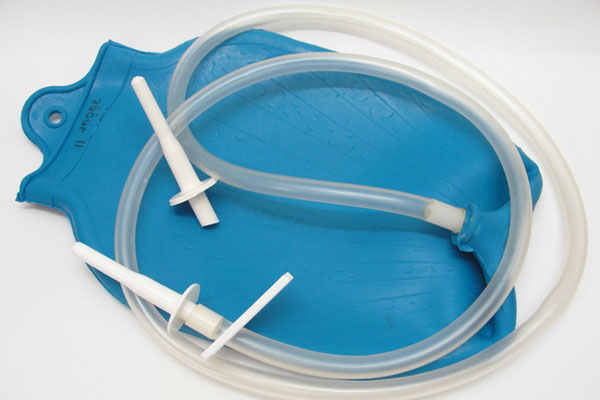
- buy an Esmarch mug at the pharmacy;
- Boil 2 liters of water and pour into a container, the water can be replaced with chamomile decoction (the enema solution should be 25⁰C-35⁰C, unless the doctor recommends otherwise);
- the person must take a knee-elbow position;
- the entrance to the anus is lubricated with cream, the tube is inserted inside;
- on the mug you need to turn the tap to slowly fill the intestines with water;
- After all the solution comes out of the container, you need to lie down and wait until you have enough strength.
Enemas help relieve problems of hard stool and constipation more quickly than oral laxatives. In addition to removing loose feces, the procedure washes the intestinal mucosa. There are two types of enemas, depending on the reason for the inability to have a bowel movement:
- Siphon. This enema is characterized by the use large quantity liquids. You can take water, herbal decoctions from sage, St. John's wort, chamomile. The solution has not only a laxative, but also an anti-inflammatory effect. For this type of enema, you need to prepare from 5 to 7 liters of liquid.
- Hypertensive. The procedure involves introducing a saline solution into the body, so 1 liter is enough. High salt concentration causes fluid to collect in the intestinal lumen. This will soften the stool and comfortably remove feces.
Effective instant remedies for constipation
Fiber for constipation
 Foods high in fiber have laxative properties. These are whole grains, vegetables and fruits. To achieve desired result you need to drink more fluids, especially water.
Foods high in fiber have laxative properties. These are whole grains, vegetables and fruits. To achieve desired result you need to drink more fluids, especially water.
The liquid helps distribute this component throughout the digestive tract. High concentrations of fiber are found in prunes, zucchini, oranges, apples, plums and peaches. From these products you can prepare decoctions and compotes, the beneficial qualities of which are preserved even after heat treatment. Regularly drinking water and eating fiber will help you forget about bowel problems.
Salt remedies
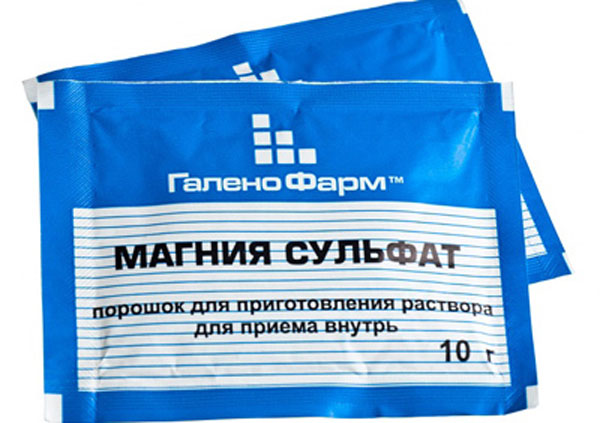 Such laxative recipes are capable of attracting liquid. Water in human body tends to move from a place with a lower concentration of salt to a place with a higher concentration. Thus, the saline solution, as it moves into the intestines, begins to fill it with liquid. Thanks to this effect, the liquid part of the blood softens the stool and promotes gentle bowel movement.
Such laxative recipes are capable of attracting liquid. Water in human body tends to move from a place with a lower concentration of salt to a place with a higher concentration. Thus, the saline solution, as it moves into the intestines, begins to fill it with liquid. Thanks to this effect, the liquid part of the blood softens the stool and promotes gentle bowel movement.
To make a simple laxative at home, you will need regular salt or magnesium sulfate, which can be bought in powder form at the pharmacy. The drug has the same effect as table salt. In 1 liter of boiled warm water you need to dissolve 1 tsp. salt or powder. The solution has a strong laxative effect. Saline laxative at home fast acting You need to drink a liter.
Kefir and oil
Some fermented milk products are indispensable for problems of the digestive tract, they are especially important for constipation. For quick bowel movements, 1 tbsp is required. kefir add 1 tbsp. l. vegetable or olive oil. The prepared medicine must be drunk in small sips at a time. Laxatives should not be taken constantly, only once. Regular use of such a fast-acting, fast-acting drug threatens the development of dystrophy and dehydration of the body.
 Milk helps stimulate bowel movements. To prepare a laxative you will need hot milk, sugar or honey.
Milk helps stimulate bowel movements. To prepare a laxative you will need hot milk, sugar or honey.
Immediately after waking up, you need to drink a glass of medicine, replacing coffee, tea and other drinks. We must remember that the dairy product should only be hot.
To improve the taste of the drink, you can add a small amount of honey or sugar to it. This recipe for a mild laxative for constipation should not be used by people with lactose intolerance.
Constipation in pregnant women
While pregnant, women often face the problem of bloating, flatulence and constipation. This is the physiological aspect of this condition. Vegetable oils, herbal infusions, and special exercises will help you cope with the problem. and only as a last resort it is necessary to undergo treatment by medication treatment. In order not to harm the baby, a preliminary consultation with your doctor is necessary.
Instant laxatives
Some traditional medicine products and recipes will help you empty your bowels in 1-2 hours. Here are some of the most effective ways to get rid of constipation: 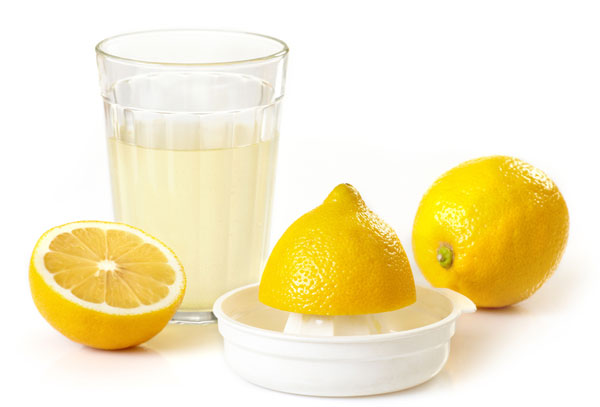
- After waking up, you need to take 1 tbsp. l. olive or sunflower oil.
- Mixture lemon juice and olive oil after meals has an increased laxative effect.
- Castor oil and fish oil will cleanse the intestines quickly, so they should not be taken before bed.
- Lemon juice has a beneficial effect on the digestive system, removing toxins and waste from the body.. Into a glass clean water you need to add the juice of one citrus fruit. The medicine is drunk at one time.
There are many ways to combat constipation; preparing a laxative at home is not that difficult. With the help of home recipes, you can not only improve the quality of stool, but also normalize the functioning of the digestive tract. To avoid any side effects from treatment, you must first consult with your doctor to ensure there are no contraindications.
Our life is full of pleasant surprises and not always pleasant surprises. If in the first case we rejoice and try not to hide our emotions, then in the second situation we want to literally “fail on the spot.” As for pleasant moments, everything is clear here, but if it comes to solving not entirely pleasant surprises, then we are in search the right way out from the current situation. Just such an unpleasant situation is the appearance in the lives of each of us of minor troubles in the form of constipation.
Although this is a solvable problem, its occurrence and presence always spoils the whole picture. How can this be? IN modern world pharmacies sell a huge range of different drugs that can quickly and permanently save a person from such an unpleasant problem. But at the same time, many pharmacies sell laxatives that do not meet the advertising requirements on the product packaging. At the same time, many medicines, which can relieve the body of constipation can have an effect on the body negative impact and cause exacerbation of other diseases. What to do in such a situation? Let's figure it out together in this confusing scheme.
In a person with normal bowel movements, constipation usually occurs sudden reasons manifestations. The reason for their appearance may be overuse the body of food in dry form, eating huge amount boiled chicken eggs or something else, but not essential for the body. If your diet does not contain raw fruits or vegetables necessary for the body, then constipation is guaranteed. Excluding the variety of grains and fibers contained in black bread from the diet eliminates a natural stimulator of peristaltic movements from the human intestine. Therefore, constipation may also occur.
Eating white bread, and foods with simple sugars, like glucose and fructose, contribute to the development of constipation in a person. Animal products, such as: butter, meat and fish food, eggs. Their predominance in the diet can contribute to the occurrence of atony in the intestines and, as a consequence, constipation. Quick, dry snacks with no thorough chewing of foods such as cheeseburgers, hot dogs, sandwiches, hamburgers and sandwiches are also causes of constipation in the intestines.
The situation is much more serious when a person develops chronic constipation. They can be caused by serious diseases that affect the organs abdominal cavity digestive system. Treatment of chronic constipation is not limited to simply using laxatives. Constipation occurs as a result of disruption of the normal formation of feces in the intestines and its further movement through the rectum. Long-term constipation in a person is very dangerous, since the body can become intoxicated with its own undigested products. At the first signs of intoxication, a person feels lethargy in the body, excessive irritability, sleep disturbance and fatigue. Lack of bowel movements can lead to the development of cancer in the body.
To all of the above you can add psychological reasons, which can also lead to a delay in the movement of feces throughout the body. "Constipation on nervous soil“This is the interpretation given to them in medical institutions. Long-term overexertion, depressive states and frequent neuroses cause involuntary contraction of the anus muscles in the body. In constant bustle, haste, nervousness, fear or anger - constipation is a common occurrence.
Activity of laxatives

Forlax is a laxative
The activity of any laxative is aimed at eliminating constipation that occurs in the intestines. Most commercially available laxatives are aimed at ridding the human body of the causes that cause the development of peculiar “plugs” in the intestines. But few of the commercially available drugs can have a therapeutic effect. Exactly long-term therapeutic effect can not only cure but also prevent their further occurrence.
The effect of many laxatives is aimed at simultaneous relief from the problem of fecal retention in the body and does not provide a preventive effect on the body that is beneficial for it. To increase the effectiveness and ease of use of laxatives, manufacturers make them in various types and dosage forms:
- Herbal preparations;
- Syrups;
- Pills;
- Powders;
- Solutions.
But the effect on the body is carried out in all the variety of forms of these drugs only on the intestines.
All laxatives, based on the strength of their components on the body, are divided into the following groups:
- Laxatives;
- Carrying means.
Laxative medications include laxatives that produce mostly normal stools in the patient. Emptying the bowels with such drugs is quick and painless. Laxatives are: burnt magnesia, laminaride, sulfur and much more. The group of laxatives includes drugs that produce loose stools in humans. Emptying the body in such cases can occur extremely unexpectedly. The group includes preparations: castor oil, senna, isafenin, laxative teas, buckthorn and others. Carrying agents stimulate increased peristaltic actions in the intestines in the body and, as a result, rather loose stools are formed.
When a person takes portable products, bowel movement can occur instantly, so it is worth staying home at this time. These drugs include medications based on saline laxatives.
Chronic or acute attacks of constipation are well resolved when a person uses laxatives or laxatives. Prescription of salt preparations to a patient or suffering from constipation is recommended by doctors only for the rapid removal of feces contained in the intestines, or when various food poisoning occurs in the body.
Irritant laxatives

This group mainly includes drugs made from plant components. Irritating laxatives belong to the most dangerous group, as they are of plant origin. These include, for example, rhubarb root and regulax. All irritant laxatives are based on their laxative effect against constipation. After taking these medications, the body feels the necessary positive and healing effect. Medicines cause chemical irritation to sensory receptors located on the walls of the colon. Due to this, peristalsis begins in the body and, as a result, the passage of feces along the entire length of the intestine towards the anus.
The site of the main action of this group of drugs is the area where the large intestine is located. During the influence of this group of drugs on the body, a single bowel movement occurs, after eight hours from taking irritating laxatives. Drugs in this group cause the sluggish intestines to begin to contract. And this is not very good. Since long-term and regular use of such laxatives causes the development of laxative disease in the body. This disease is characterized by an imbalance of electrolyte balance in the blood, degradation of the nerve endings of the superficial layer of the intestine and the formation of the “lazy gut” symptom. Drugs in this group are not recommended for use during pregnancy.
Bulk laxatives
This includes not only medicines having natural origin, but also synthetic polysaccharide compounds that are difficult to digest. In some cases, the digestion of such polysaccharides is practically impossible. Absorption of such substances into the blood also does not occur. Representatives of drugs in this group are the following substances: flax seeds, agar-agar, wheat bran, methylcellulose, flaxseed, sterculium.
The action of drugs in this group is based on their absorption of water with subsequent stretching of the muscular walls of the intestine. Bulk laxatives, when ingested, swell greatly and then begin to stretch the intestinal walls, where constipation occurs. As a result, a pushing wave is created, which, when excited, begins to push feces through the intestines. As a result, constipation is eliminated and the long-awaited emptying of the body occurs. The described effect of drugs in this group is capable of maintaining the property of the colon to stretch and increase in size. A group of bulk laxatives is aimed at increasing internal volume in the intestines.
These laxatives have a gentle effect on the body and gradually empty the intestines. After taking medications, formed feces leave the body after ten or more hours.
Taking these drugs stimulates the formation of strong flatulence in the body. In addition, frequent use of these laxatives can lead to stretching of the intestinal walls that is uncharacteristic for the body. Regular use of drugs of this group stimulates with a characteristic rumbling in the abdomen. The intake of bulk laxatives must be accompanied by the intake of large amounts of liquids. As a result of drinking plenty of water, the process of urination is known to increase, despite the fact that the intestinal walls are in a distended state.
The use of bulk laxatives is prescribed by a doctor if the patient has mild constipation, since the drugs have a weak effect on the body. You should not resort to using these drugs if a person has constipation with a new effect - “slow transit”. In case of defecation disorders, neurological disorders, prescribed bed rest, compaction of formed feces and disorders of intestinal patency, these laxatives are contraindicated. During pregnancy, the use of drugs in this group is also excluded, as the risk of miscarriage increases.
Osmotic laxatives
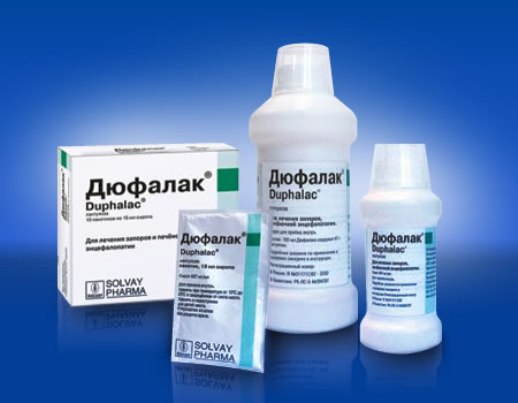
Duphalac is a popular laxative
This group of products is quite common among the population of our country, has a positive effect when used and is available to all pharmacy chains. Osmotic effects are created in the body by drugs made with an admixture of saline solutions. These include the familiar polyethylene glycol. Osmotic laxatives provide symptomatic treatment to the body, since their action is not aimed at eliminating the causes of constipation. Drugs in this group are practically safe, and their long-term use does not lead to the formation of a “lazy gut” effect in the body. The use of drugs does not cause addiction in the body.
The effect of these drugs on the body is based on their ability to retain fluid in the internal lumen of the intestine. These drugs lead to liquefaction of fecal residues by dissolving retained fluid in them. Due to this, there is an increase in the amount of feces and an increase in osmotic pressure on the intestinal walls due to their softening. And with regular use of drugs of this group, feces are at risk of losing the electrolytes they contain, such as sodium or potassium salts. For older people suffering from malfunctions of the cardiovascular system, this process is extremely undesirable. Because potassium is important for the functioning of the heart muscle. Therefore, the use of drugs from this group of people in this category is prescribed according to the doctor’s recommendations and is used for no more than three months.
When a patient is diagnosed with acute constipation, medications are also not advisable for use. Osmotic laxatives are effective in cases of poisoning of the body with food substances, as well as drugs. Polyethylene glycol, which belongs to the class of organic high-molecular compounds, is prescribed to relieve constipation in pregnant women and nursing mothers.
Prebiotics

These include food components that are indigestible in the body. The structure of their structure cannot be digested by the organs of the gastrointestinal tract. Entering the intestinal environment in an unchanged state, they stimulate the reproduction of the microflora found in it. This category includes products called lactulose and drugs containing fructo-oligosaccharidose groups. All of these drugs are good laxatives, as they contribute to the complete restoration of intestinal function throughout its entire length.
Prebiotics retain the water necessary to liquefy feces and ensure complete intestinal motility. Their effect occurs in the large intestine, and the duration of action is minimal. The use of prebiotics in the early stages can stimulate the formation of flatulence in the body. Drugs in this group are prescribed to patients for acute as well as chronic manifestations of constipation. Sometimes these drugs are prescribed to patients before undergoing any kind of surgical intervention. We looked at several groups of laxatives, which have their own advantages and disadvantages.
When purchasing this or that drug yourself from a pharmacy chain, make sure it belongs to a particular class and carefully read the instructions provided for it. should be accompanied by appropriate consultation with the attending physician. Self-medication, especially for pregnant women, can be unpredictable.
You can learn more about laxatives from the video:
Noticed a mistake? Select it and click Ctrl+Enter to let us know.
Tell your friends! Tell your friends about this article in your favorite social network using social buttons. Thank you!

Quick-acting laxatives at home - this topic is becoming increasingly in demand.
In the modern world, people live in a very stressful rhythm, so often this lifestyle can cause various ailments. Poor nutrition sedentary work, stress and a persistent slowdown in digestive processes and associated troubles are just around the corner.
Usually accompanied by bloating and heaviness in the abdomen, pain in the intestines, loss of appetite, general weakness of the body and even the development of hemorrhoids. Given the widespread interest in traditional medicine, treatment or prevention of any diseases is preferred to be carried out at home.
To get rid of obstructive bowel problems, there are many homemade laxatives that are easy to use without running to the pharmacy for expensive medications.
Popular non-drug laxatives are:
1. Herbal preparations - herbs, vegetables, fruits, berries, bran;
2. Sour milk - kefir, yogurt;
3. Oils - olive, sunflower, castor, almond, etc.;
4. Correct consumption of water and food;
5. Physical exercise;
6. Enemas.
Laxatives at home - classification
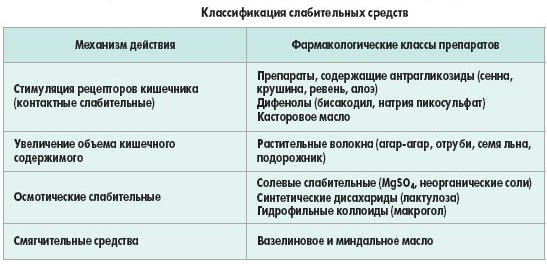
Herbal preparations
Medicinal decoctions
The first place among laxatives at home is occupied by medicinal herbs. By brewing them separately or in certain consistencies, you can significantly improve your health and get rid of constipation; they stimulate intestinal motility well and help dilute stool.
The most common of them:
- rhubarb;
- buckthorn bark;
- dandelion roots;
- licorice;
- common nettle;
- senna leaves.
The recipe for preparing these products is almost the same - 2 tablespoons of raw materials per half liter of boiling water. Let it brew. Accept better in the morning before breakfast or in the evening before going to bed. The effect will be in approximately 4-8 hours.
Herbal infusions
- , yarrow herb and licorice. It has a gentle effect and is used in children and pregnant women;
- for severe and prolonged constipation, use tansy, St. John's wort. Decoctions are consumed before meals;
- aloe juice with honey will be a good helper for chronic stool retention. Pour one spoonful of honey and juice into a cup with warm water and consume twice a day for a month;
Fast acting laxative at home for children
For children from 2 years old
Take 2 drops of valerian and motherwort, glucose, magnesium sulfate 2 tablespoons, ascorbic acid powder in one and a half glasses of baby water.
Take a dessert spoon in the morning and evening.
For babies
For very small children, you can brew dill seed, this will soothe an aching tummy and ease colic. Use 100 grams three times a day.

Use of herbal laxatives folk remedies They are not recommended for a long time because their effect decreases and addiction occurs.
Vegetables and fruits - helpers for soft stools
Not least important in the fight against constipation are the following foods: beets, prunes, dried apricots, apples, peas, beans, spinach, seaweed.
Regular consumption reduces the risk of stool retention and improves bowel function immediately when a problem occurs.
Fruits and vegetables make delicious laxatives.
- So, for example, by grating pumpkin and, we get a healthy and appetizing puree for correcting stool.
- Compote is made from prunes and apples, drinking it throughout the day.
- For lovers of borscht and vinaigrettes, the risk of constipation is very low. Vegetable juice from
In general, fiber-rich foods are very effective in combating constipation.
- A very simple way to relieve bowel problems is cabbage juice. It is sometimes replaced with cucumber pickle or sauerkraut. Apply twice a day.
- Flax seeds also have a laxative effect, green tea with milk, .

Oils for laxative effect
Oils are a good way to ease the intestines. They act quickly, in about 3-4 hours.
Having chosen the oil to your taste, take it in the morning on an empty stomach, one tablespoon at a time: vegetable sunflower, olive, almond, vaseline, and others.
Essential oils are not fast-acting homemade laxatives, so they should not be consumed.
Fermented milk products with laxative effects
Has another laxative effect kefir, yogurt. Kefir by itself does not eliminate constipation and has weak emollient properties, but it can improve the process of bowel movements and, with regular use, reduce the occurrence of constipation to a minimum.
Kefir works quickly with the addition of a spoon of vegetable oil, literally in an hour.
Proper nutrition that regulates stool
To normalize intestinal function, you need to follow the correct diet.
Those who constantly experience constipation should include this in their diet. drinking about two liters of water and vegetable juices.
In the morning, it is best to eat different cereal porridges for breakfast: oatmeal, barley, wheat.
Lunch should always include all kinds of soups and broths.
Throughout the day, instead of snacking on sandwiches, it is better to give preference to fruits and vegetables. You should also limit or completely eliminate fruit juices, soda, strong tea and coffee from your diet.
Exercise to relax your bowels
No one will argue that sports exercises are beneficial for everyone; they not only help keep the body in good shape, but also improve the functioning of the body as a whole.
By performing a certain set of physical tasks, you can eliminate or completely eliminate problems with bowel retention: bicycle, scissors, bridge, “cat” on all fours, bend your back in the lower back up and down.
Also suitable swimming, race walking and running.
Enemas
For those who do not want to brew decoctions, practice physical exercise or allergies to foods, enemas will help. They are successfully used by all categories of citizens.
Their action is to flush the intestinal walls, which enhances peristalsis and removes dense feces. Helps with acute and chronic constipation.
You can do enemas based on herbs: chamomile, sage, because in addition to a laxative effect, they will also have anti-inflammatory effects.
Also used saline enemas- they soften solid masses and promote their release. 1 spoon of salt per liter of water.
*****
When resorting to self-treatment with fast-acting laxatives at home, you should remember that the effect will be greater if everything is used in combination with correct mode nutrition and exercise.
The advantage of folk remedies is that they keep the intestinal microflora in order and are easy to use, taste good (herbal infusions, food), and are affordable for any pocket. Most often they are safe for children, pregnant women and people with weakened bodies.
Constipation is a difficult act of defecation that occurs due to various reasons: poor diet, lack of physical activity, abuse of medications, pregnancy, intestinal pathologies, etc. Any pharmacy offers a wide range of laxatives to relieve constipation. But, like all medications, laxatives also have their indications and contraindications for use.
These remedies are the fastest and most effective laxatives for constipation. Their action is due to irritation of the receptors, with the help of chemicals, of the large intestine, which enhances peristalsis and causes its emptying after a few hours. Laxative irritating effect Recommended for acute, occasional constipation. It is not recommended to use this group of products for more than 10 days, since there is a high probability of complications: intestinal atony, destruction of nerve receptors, dehydration and loss of salts by the body.
| Bisacodyl - tablets, suppositories (analogues: Dulcolax, Bisacodyl-Acri, Bisacodyl-Hemofarm) |  |
| Active ingredient:
Bisacodyl. |
Description:
A laxative used for acute constipation, increasing contraction of the intestinal walls. |
| Properties:
A laxative for constipation, which increases contraction of the intestinal walls, contains substances that activate the intestinal glands, promoting the production of mucus. Thanks to this, feces come out painlessly. |
Application:
Treatment begins with 1 tablet or 1 suppository. The tablet is taken in the evening, after dinner, the suppository is inserted into the rectum before bedtime. If the expected effect does not occur in the morning, the amount is increased to 2-3 tablets (or 2 suppositories). When preparing for an examination or operation, drink 2 tablets before going to bed or administer 1 suppository of the drug rectally a day or on the eve of the procedure or operation. |
Indications:
|
Contraindications:
The drug should be used with caution:
|
Side effect:
|
Price:
From 20 to 50 rubles. |
| Guttalax – drops, tablets (analogues: Slabilen, Laxigal, Guttasil, Regulax Picosulfate) |  |
| Active ingredient:
Sodium picosulfate monohydrate. |
Description:
A mild laxative that irritates the intestinal receptors responsible for its peristalsis. |
| Properties:
A laxative for constipation stimulates contraction of the intestinal walls and also reduces the body's loss of water and electrolytes. |
Application:
Tablets are taken orally at night, in the amount of 1-2 pieces. Drops – 10-20 drops (5-10 mg). Drops and tablets should not be used for more than 10 days. |
Indications:
|
Contraindications:
|
Side effect:
|
Price:
From 200 to 300 rubles. |
| Senade - tablets (analogues: Senadexin, Gerbion Laxana, Glaxenna) | 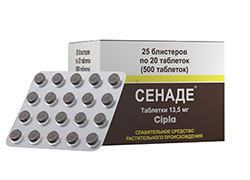 |
| Active ingredient:
Senna leaf extract. |
Description:
A herbal laxative for constipation, stimulating peristalsis of the intestinal walls. |
| Properties:
Laxative with senna leaves promotes fast and gentle bowel movements. Does not cause addiction or changes in stool. A fast-acting laxative, the average time for the expected effect to occur is 8 hours. |
Application:
Tablets are taken orally at night in the amount of 1 piece. If there is no effect, the number of tablets can be increased to 3 pieces. per day. |
Indications:
|
Contraindications:
The drug should be taken with caution in the following cases:
|
Side effect:
|
Price:
From 550 to 600 rubles. |
| Buckthorn – tablets (extract), bark | 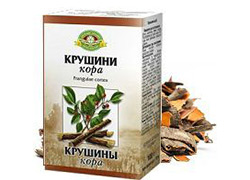 |
| Active ingredient:
Dry buckthorn extract. |
Description:
Laxative preparation based on herbal ingredients. |
| Properties:
The plant contains anthraglycosides, which cause irritation of receptors in the intestinal walls, resulting in a laxative effect. The tannins in the product soothe the irritated intestinal mucosa, which is injured due to stagnant feces. |
Application:
Take 1-2 tablets at night. The bark is brewed according to the instructions for use. |
| Indications:
Chronic constipation. |
Contraindications:
|
Side effect:
|
Price:
From 50 to 200 rubles. |
| Phytotransit - tablets (analogues: Laminaria tablets) |  |
| Active ingredient:
Laminaria thallus. |
Description:
Herbal laxative. |
| Properties:
The active substance of plant origin has an irritating effect on the nerve receptors of the intestine, restoring its peristalsis and enhancing the functioning of the glands that produce mucus. This promotes gentle evacuation of feces. |
Application:
To treat constipation, take 1 tablet 2 times a day. |
| Indications:
Chronic constipation caused by impaired intestinal motility. |
Contraindications:
|
Side effect:
|
Price:
From 170 to 230 rubles. |
| Rektaktiv - candles |  |
| Active ingredient:
Chestnut fruit extract. |
Description:
A laxative prescribed for occasional constipation. |
| Properties:
Horse chestnut extract stimulates the natural contraction of the intestinal walls, causing rapid evacuation of feces. |
Application:
Apply 1 suppository 1 time per day, in the evening. It is allowed to increase the dose up to 3 pcs. per day to normalize the act of defecation. Use of the drug for more than 10 days is allowed only after the approval of a specialist. |
Indications:
|
Contraindications:
|
| Side effect:
Burning in the rectum. As a rule, this symptom goes away on its own after a few minutes. |
Price:
From 230 to 350 rubles. |
| Glycelax - suppositories (analogues: Glycerin, Glycerin suppositories) | 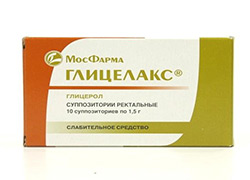 |
| Active ingredient:
Glycerol. |
Description:
Rectal laxative suppositories for constipation. |
| Properties:
When introduced into the rectum, the active substance irritates the intestinal walls, which causes reflex contractions and increases peristalsis. Glycerol coats feces, making bowel movement pain-free. |
Application:
Rectal suppositories are administered into the rectum in the morning in the amount of 1 pc. It is allowed to use no more than 1 candle per day. |
| Indications:
Constipation resulting from age-related changes, psychogenic factors, and limited mobility. |
Contraindications:
|
Side effect:
|
Price:
From 80 to 160 rubles. |
| Mucofalk (Analogues: Fitomucil) |  |
| Active ingredient:
Psyllium seed hull powder. |
Description:
Laxative herbal medicine for preparing an oral solution with orange flavor. |
| Properties:
The active ingredient of the drug increases in volume upon contact with liquid in the gastrointestinal tract. Due to this, mechanical irritation of the intestinal walls occurs, its peristalsis increases and constipation is eliminated. Plantain seeds have an anti-inflammatory effect, so it is advisable to use the product at any stage of hemorrhoids. |
Application:
Use 1 sachet 1 time per day. The contents of one package are dissolved in 150 ml of cold boiled water. The prepared solution is drunk immediately after preparation. You can drink it with a glass of liquid. The use of the drug has no age restrictions. It can be used as a laxative during pregnancy, breastfeeding, as well as for the elderly and children. |
Indications:
|
Contraindications:
|
| Side effect:
In rare cases, in the first days of taking the drug, bloating and heaviness in the abdomen increase. |
Price:
From 450 to 600 rubles. |
Osmotic laxatives
A group of laxatives recommended for use for one-time cleansing of the intestines in case of acute constipation or before endoscopic examination of the large intestine or in case of food and drug poisoning. Osmotic drugs are not addictive and do not cause “lazy gut” syndrome. They act symptomatically and do not eliminate the root cause that caused constipation.
The main effect of laxatives for constipation is based on increasing osmotic pressure by retaining water in the intestinal ducts. This causes stool to soften and increase in volume and, as a result, creates a laxative effect. It is not recommended to use osmotic agents for chronic constipation. Despite their mild effect, their use for more than three months causes a serious imbalance of water and electrolytes in the body, which leads to dehydration and loss of important microelements by the body.
| Magnesium sulfate – powder (analogs: bitter salt, Epsom salt, Magnesia, Epsom salt) |  |
| Active ingredient:
Magnesium sulfate. |
Description:
Osmotic type laxative. |
| Properties:
Magnesium sulfate increases the flow of water into the intestinal ducts and is not absorbed into the blood. As a result, the feces soften and increase in volume, which causes a natural urge to defecate. |
Application:
For constipation, a laxative is taken in the amount of 20 g on an empty stomach, 1 time per day for adults; 5 g – children 6-12 years old; 10 g – adolescents under 18 years of age. |
Indications:
|
Contraindications:
|
Side effect:
|
Price:
From 50 to 100 rubles. |
| Fortrans – powder (analogues: Forlax, Realaksan, Osmogol, Tranzipeg) | 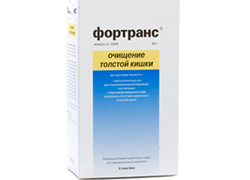 |
| Active ingredient:
Macrogol. |
Description:
A laxative for constipation with osmotic properties, used to cleanse the intestines. |
| Properties:
The laxative does not affect other organs because it is not absorbed into the general bloodstream from the stomach. Fortrans has a very powerful and rapid laxative effect, completely cleansing the intestines even of unformed feces. |
Application:
The contents of one sachet are dissolved in 1 liter of cold boiled water. The drug is taken every hour in an amount corresponding to the calculation: 1 liter of ready-made solution per 15-20 kg of human body weight. If the product is used to cleanse the colon before procedures, its use should be completed at least 4 hours before diagnosis. |
Indications:
|
Contraindications:
The product should be used with caution by elderly people. |
Side effect:
|
Price:
From 100 to 150 rubles for 1 sachet. |
| Microlax - microenema with sodium citrate |  |
Active ingredient:
|
Description:
Combined product with a laxative effect: has an irritating effect and softens stool. |
| Properties:
Microenema has an almost instant effect, diluting stool within 15-20 minutes. The main advantage of the product is that it does not affect the functioning of the intestines as a whole and is not addictive. The substances in the microenemas actively stimulate the flow of water into the intestines, which contributes to the rapid dilution of feces and their rapid evacuation. In this case, all components of the product are excreted in the feces and are not absorbed by the body. |
Application:
The tip of the microenema is inserted along its entire length into the rectum. Used when characteristic symptoms of constipation occur. If bowel dysfunction continues long time, consultation with a specialist is required. |
Indications:
There are no age restrictions: microenemas can be used to cleanse the intestines during pregnancy and breastfeeding, children and the elderly. |
Contraindications:
|
Side effect:
|
Price:
From 300 to 450 rubles. |
Laxatives with prebiotics
These products have a slow, but mild and safe effect. They can be used by pregnant and lactating women, elderly people, and during the recovery period after surgery and childbirth. Prebiotic agents are recommended to be taken for acute and chronic stool disorders. The substances that make up laxatives have a beneficial effect on the state of the intestinal microflora, increasing the number of beneficial bacteria.
| Portalac – syrup (analogues: Lactulose, Normaze, Duphalac) |  |
| Active ingredient:
Lactulose. |
Description:
Laxative for constipation with osmotic properties. |
| Properties:
Laxative enhances intestinal motility by increasing osmotic pressure in the intestinal ducts. The drug also normalizes the composition of the intestinal microflora, enhancing the growth of beneficial bacteria. |
Application:
To relieve constipation, take 15 ml orally 3 times a day. This dosage is maintained for three days. Then the amount is reduced to 10 ml 3 times a day. |
| Indications: | Contraindications:
|
Side effect:
|
Price:
From 265 to 350 rubles. |
| Exportal – powder |  |
| Active ingredient:
Lactitol monohydrate. |
Description:
Laxative-prebiotic for the treatment and prevention of constipation with osmotic properties. |
| Properties:
Lactitol is an active prebiotic that reaches the large intestine unchanged. The drug softens stool, increases osmotic pressure inside the intestinal ducts, and promotes gentle bowel movements. It also has a beneficial effect on quality and quantitative composition intestinal microflora, creating a favorable environment for the development of beneficial microorganisms. |
Application:
The powder is mixed with water, tea, coffee, juice and immediately drunk. In this case, the entire daily dose (20 g) is taken in 1 dose. When the stool is normalized, when the resulting effect is stable (bowel emptying occurs once a day), the amount of the drug taken can be reduced by 2 times. The course of treatment is long - 5 months. |
Indications:
|
Contraindications:
|
Side effect:
|
Price:
From 240 to 300 rubles. |
Complex action drugs
This group of drugs has a complex effect and is intended for the treatment of chronic diseases of the gastrointestinal tract, as well as for the elimination of chronic constipation and stool disorders.
| Allohol UBF | |
Active ingredient:
|
Description:
A drug that enhances the secretion of the digestive tract organs, restores intestinal motility, reduces flatulence and has a laxative effect. |
| Properties:
The active substances of the drug have a complex effect on the functioning of the liver, stomach and intestines. Thanks to the normalization of bile formation, it increases motor activity intestinal walls, eliminates the proliferation of putrefactive and fermentative bacteria in the intestines. |
Application:
To treat constipation, take 2 tablets 3 times a day after meals. The duration of treatment is 20-30 days. |
Indications:
|
Contraindications:
|
Side effect:
|
Price:
From 20 to 100 rubles. |
| Spasmonet - tablets (analogues: Drotaverine, No-Shpa) |  |
| Active ingredient:
Drotaverine hydrochloride. |
Description:
An antispasmodic used to treat organ dysfunction caused by smooth muscle spasms. |
| Properties:
The active substance of the drug helps normalize stool and constipation caused by spasm of intestinal smooth muscles. The drug relieves pain, eliminates spasms, restores normal functioning of the organ and prevents tissue necrosis. |
Application:
It is allowed to take up to 6 tablets per day until the spasm of intestinal smooth muscles is eliminated to obtain a laxative effect. |
Indications:
|
Contraindications:
|
Side effect:
|
Price:
From 70 to 150 rubles. |
Folk remedies for constipation
If the causes of defecation disorders are not diseases of the digestive tract or inflammatory, purulent processes in the intestines, then to treat constipation, you can use folk laxatives prepared at home. When choosing herbal ingredients for them, you should definitely take into account individual intolerance to the ingredients.
Decoctions and infusions
For constipation, it is advisable to use herbal preparations from medicinal plants for oral administration. They have a complex effect: enhance peristalsis, reduce irritation, and restore intestinal microflora.
To relieve constipation caused by spasm of intestinal smooth muscles:
- dill or fennel seeds;
- dried mint or lemon balm leaves;
- mistletoe inflorescences;
- three-leaf watch;
- dandelion root, valerian and rhubarb.
To eliminate atonic constipation caused by sluggish intestinal motility:
- hop cones;
- dill or fennel seeds;
- dandelion root;
- toadflax;
- tansy inflorescences;
- centaury.
All ingredients are taken in equal proportions: for cooking 1 tbsp. infusion – 0.5 tsp. each plant. Next, the dry mixture is poured with 200-250 ml of boiling water, infused and drunk in one or several doses throughout the day until a laxative effect is obtained. Every day a new decoction is prepared.
Oils
 To relieve constipation at home, you can use it as a laxative. various oils. They are taken orally or added to a cleansing enema solution. This method Use only for adults. For children, oils are used only as external agents. The following drugs cause defecation:
To relieve constipation at home, you can use it as a laxative. various oils. They are taken orally or added to a cleansing enema solution. This method Use only for adults. For children, oils are used only as external agents. The following drugs cause defecation:
- linen;
- pumpkin;
- Vaseline;
- castor
The oil is taken orally at a dose of 15-30 g for half an hour. You should not use this laxative for more than three days. Oils are added to the cleansing enema solution in an amount of 50 ml.
Nutrition
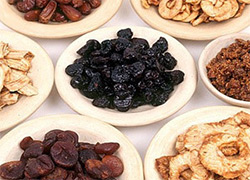 Products included in the daily menu can also help normalize bowel movements and prevent frequent constipation. In case of defecation disorders, first of all, you should give up alcohol, fatty and fried foods, sweets and baked goods and give preference to products with a laxative effect:
Products included in the daily menu can also help normalize bowel movements and prevent frequent constipation. In case of defecation disorders, first of all, you should give up alcohol, fatty and fried foods, sweets and baked goods and give preference to products with a laxative effect:
- raisins and prunes;
- figs (it is recommended to eat it on an empty stomach);
- beet;
- beet, carrot, pumpkin juices;
- bran;
- honey mixed with walnuts;
- fermented milk products;
- sea kale.
It is very useful for constipation before going to bed to drink a glass of kefir or fermented baked milk at night. And it is very important to drink less than 2 liters of still water during the day.
Which laxative to choose?
Any laxative must be not only effective, but also harmless to the body. Before using absolutely any drug, you should carefully read the instructions, especially contraindications and side effects. It is necessary to select drugs taking into account the following factors:
- Acute, occasional constipation that does not have a chronic course - in this case, you can take irritating laxatives or eliminate constipation by increasing the osmotic pressure inside the intestinal ducts: Fortrans, Bisacodyl, Guttalax. But it should be remembered that they have multiple contraindications and side effects, the only exception being Microlax microenemas.
- Chronic constipation - in this situation, it is better to give preference to laxatives with prebiotics: Portalac, Exportal. They act gently, restore intestinal microflora, and are not addictive. The products in this group are most suitable for children, pregnant women and the elderly.
- Spastic constipation (impaired defecation caused by spasm of the intestinal muscles) - to eliminate the painful condition, you should use painkillers that relax muscles and reduce tone: Spasmonet, No-Shpa, Drotaverine.
It should be remembered that all laxatives for constipation do not treat the root cause of its occurrence, but only eliminate the characteristic symptoms. Therefore, in case of systematically occurring stool disorders, it is necessary to consult a doctor. Only a specialist will help identify factors that disrupt the functioning of internal organs and help select the most suitable effective drug, taking into account all indications and contraindications for its use.
Although there is a lot associated with laxatives funny cases, these drugs should be in every first aid kit. – the problem is quite serious, causing discomfort and at times unsettling. And strong laxatives are created specifically to get rid of this problem as soon as possible. In this article we will talk about the most effective drugs.
Classification of strong laxatives
To begin with, it is worth noting that laxatives are medications that eliminate only the unpleasant symptoms of the disease, but they do not destroy the underlying cause. Therefore, if constipation torments you with unenviable consistency, it is best not to abuse laxatives, but to go straight to a specialist.
And just in case, you can put several medications in your first aid kit. All strong laxatives are divided into several categories.
Bulk laxatives
They are of natural origin. The body perceives them well, but does not digest them. Main representatives:
- agar-agar;
- wheat bran.
Irritant laxatives
The largest group of drugs, which includes strong drugs that begin to act a few hours after administration. Famous representatives of the group:
- Regulax;
- Dulcolax;
- Guttalax.
Osmotic drugs
Quite effective and non-addictive with long-term use. The category of osmotic drugs includes:
- Carlsbad salt;
- magnesium and sodium sulfate.
Prebiotics
Another group of strong laxatives for constipation. Special laxative prebiotics promote the growth of normal intestinal microflora, thereby improving its function. Most famous representatives groups:
- Lactusan;
- Duphalac;
- Prelax.
Fast-acting strong laxatives
Buying a laxative at a pharmacy today is as easy as buying an analgesic. Most medications are available freely without prescription. Let's look at the most popular and effective drugs.
Guttalax
A well-known strong laxative in drops. It is considered one of the safest, so even pregnant women and nursing mothers can take it. Before taking Guttalax, you need to dilute it in water.
Prelax










